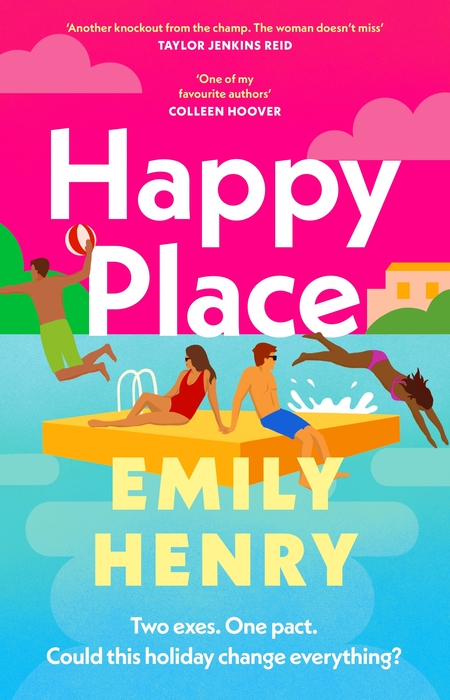(courtesy Penguin Books Australia)
One of the things that no one tells about getting older is that all those people you knew and valued and loved when you were younger might not be the same people as you move further into adulthood.
If you think about it logically, that makes sense; who among us stays the same year after year, frozen in time like some human-sized Polaroid?
But let’s honest, none of us approaches the people and things we value most in life with any sort of unemotional logicality, and so as people change, and yes, we change too because we’re not fossils stuck in stone, we find ourselves either moving and adjusting with them, or growing apart, people we were once close too suddenly becoming blips in the chronological and emotional distance.
It’s a tough thing to deal with, and it’s something confronting the central characters in Emily Henry’s latest heartfelt novel, Happy Place, where a group together since university (or college as it’s referred to in the U.S.) have gathered for the last time at a much-loved cottage in Maine where they have met every summer for years.
Some exciting things are in play, and one not so great, but all of them signal the fact that Harriet & Wyn, Sabrina & Parth, and Cleo & Kimmy are not the same people they once were and that life is changing and fast.
It’s not just the sale of Sabrina’s dad’s cottage that’s weighing on them; far more pressing, for Harriet and Wyn at least is that they broke up five months earlier and have told no one.
NO ONE.
I feel the moment his gaze lifts off me and returns to the windshield, but he’s left a mark: from now on, dar cliffs, wind racing through hair, cinnamon paired with clove and pine—all of it will only mean Wyn Connor to me. A door has opened, and I know I’ll never get it shut again.
That’s right, the people to whom they are closest in the world have no idea that the perceived most perfect couple in the world, who met one day eight years earlier when Wyn collected Harriet from the airport when everyone else was a tad too drunk to do the deed, are not a thing anymore.
Carrying off the charade that they are still a couple falls to them only because Sabrina, who has something BIG in mind for the week, essentially emotionally blackmailed Wyn into attending, and after Harriet recovers from the shock of seeing them there, they have to draw on all their acting skills to pretend to be whom everyone else still assumes they are.
It’s going to be a long week, and while they both agree it won’t be easy but they’ll to do the best they can (they’re all very adult and reasonable about it, at first), all of the hurt of the break-up, initiated by Wyn for reasons that eventually become clear, come spilling out, at least between them and they begin a less-than-merry passive-aggressive dance that stays mostly hidden from prying eyes.
Harriet is in agony though; she’s here with her two best friends in the world, her family for all intents and purposes, and not telling Sabrina and Cleo who are like sisters to her, is a nightmare from which Harriet, who goes through the motions of drinking too much wine, eating far too much lobsters and ticking all the week together boxes, just can’t seem to wake.
Happy Place is right up there with Henry’s best, a love letter to found families and enduring friendships which is sage enough to realise that nothing stays the same in life and that even the best things in the world, the relationships and friendships which comfort and sustain us, can’t stay exactly the same forever.
It doesn’t shy away for a second from the searing pain of knowing that the people who were our world suddenly stop being the full extent of it and become a part of it, albeit a very important one, without which life feels diminished and hollowed.
How then to navigate this tricky transition between young adulthood, where everything feels limitless and unchanging and always intensely good and possible, and later adulthood, for this particular group, their early thirties, without losing everything you love?
That’s where Happy Place comes into its own, serving up a beautifully affecting look of people losing and then finding each other again, and how it can be done, just not as easily as you thought and with some messy segues in-between that leave you feeling disoriented and unsure of the next steps going forward, but knowing they must taken one way or another.
Reaching deep into your soul and connecting with that part of you that needs to keep close to those that mean everything to you, Happy Place is both a sparklingly funny joy and a wise acknowledgement that great and seismic change this way comes whether we like it or not.
‘How can love end up like that?’ I said thickly. ‘ How is it possible to love someone so much and have it all just go away?’
The thought of resenting Wyn like that is torture. The thought of him resenting me is even worse. Of holding him back, keeping him from what he wants.
Filled to the welcoming brim with whipsmart, joyously bubbly dialogue and moments of real, dark emotional pain, all set against an idyllic week, setting and activity-wise at least that sounds like the kind of holiday we all need, Happy Place is bursting with the kind real, honest humanity that marks Henry’s books as something special.
While there is a fairytale rom-com quality to them with a healthy dose of wish fulfilment thrown into the mix, Henry’s books always sit in the real world of human relationships with all of her characters having to really go through the ringer and earn their happy-ever-after, assuming one is even in the offing (it usually is but there is no guarantee at any point that you will get there or that it will be easily reached).
Happy Place does an hilariously funny and soul-searingly honest job of celebrating those close ties that bind us while acknowledging that they are not inviolable to time and change and that we must fight for what and whom we love if we don’t want to lose them.
You will dive into Happy Place because of its slapstick-potential premise and stick with it wholeheartedly because of its beautifully formed characters who capture your heart with their fun, humanity and relatability, it’s writing which is vibrant and heartfelt to the hilt, and its sage understanding of how much we need our found families and the people to whom we belong and whom love without condition, but that as life moves on and morphs and changes, that we must work hard to hold onto them and keep them close and keep as alive and as important into the future as they have been and must continue to be if life is going to keep feeling like home.

